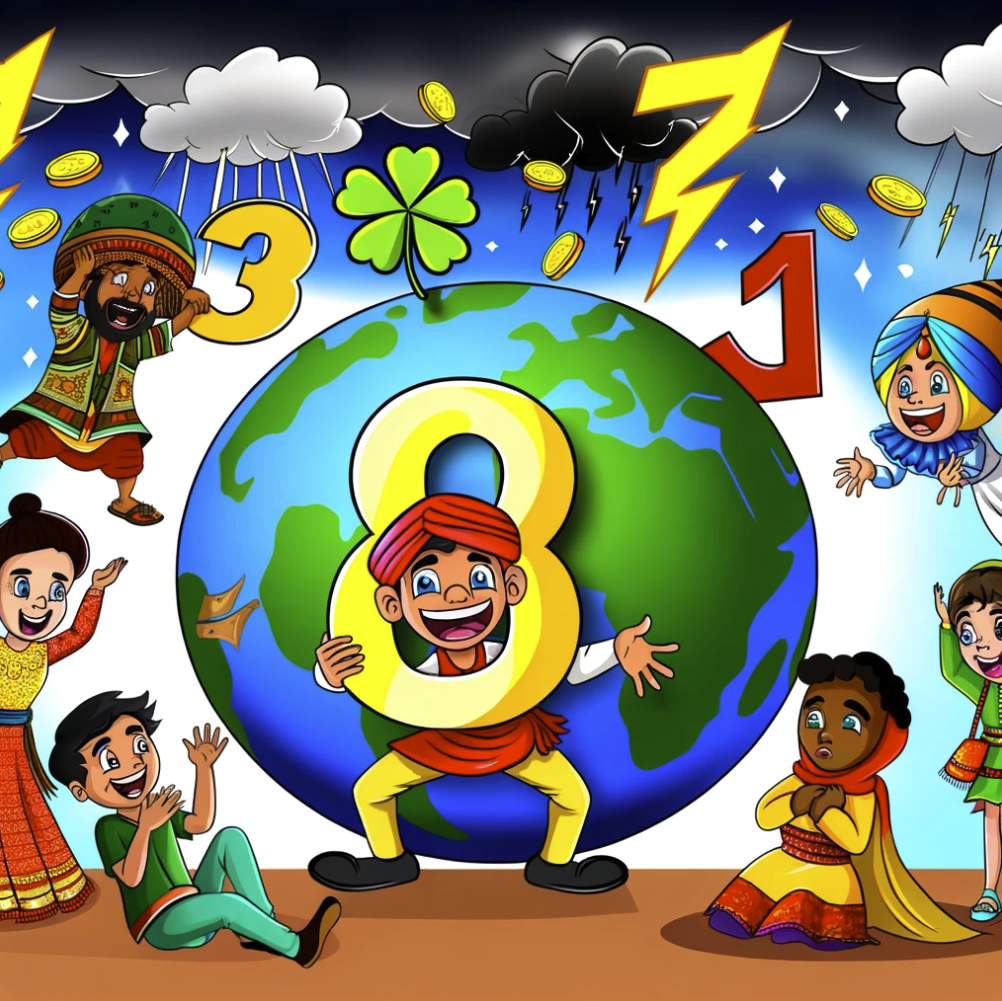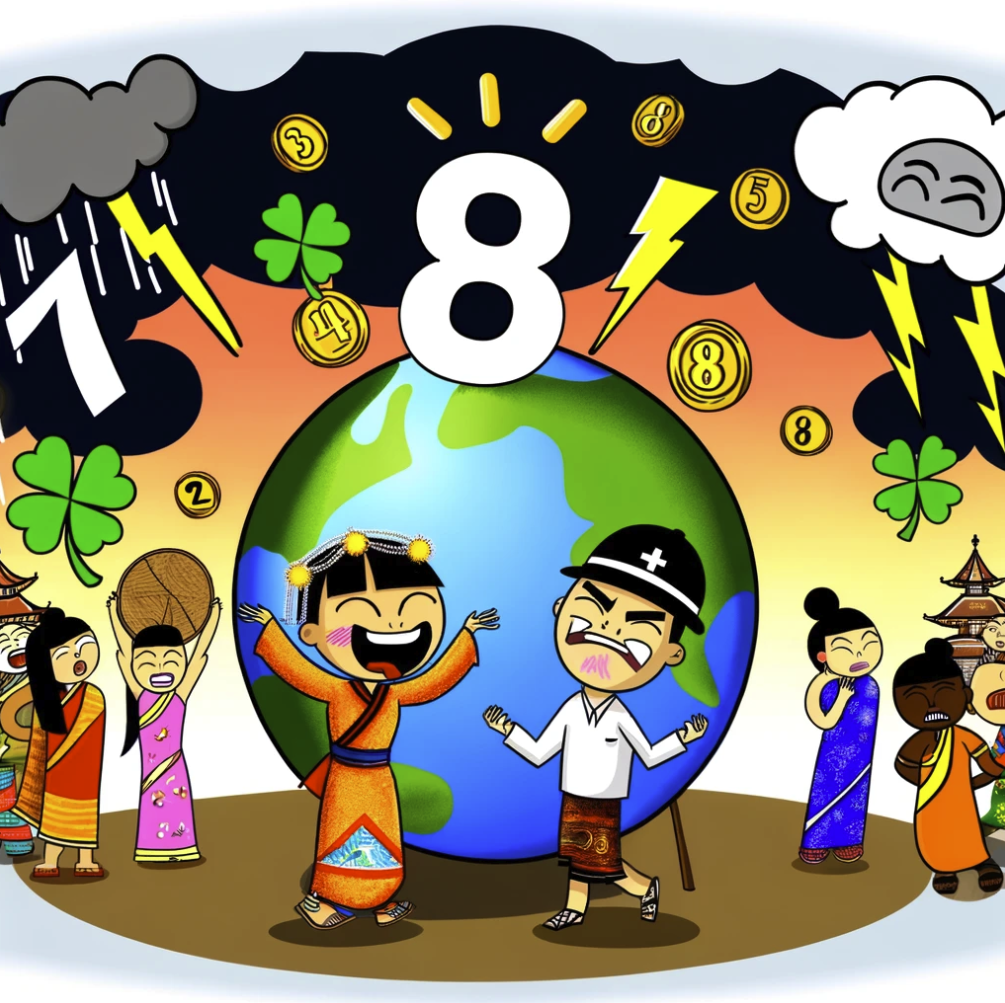In Chinese culture, numbers carry significant symbolic meanings, often based on how they sound when spoken.
This belief influences various aspects of life, including business, celebrations, and daily activities.
Certain numbers are considered lucky due to their positive associations, while others are deemed unlucky because of their negative connotations.
Lucky Numbers
The Number 8
The number 8, pronounced as ‘Ba’ in Chinese, sounds similar to the word for wealth or fortune (‘Fa’).
It’s the most auspicious number in Chinese culture, symbolizing prosperity, success, and high social status.
The Beijing Olympics, for instance, commenced at 8 seconds and 8 minutes past 8 PM on August 8, 2008, highlighting the number’s significance.
The Number 9
Number 9, pronounced as ‘Jiu,’ represents longevity and eternity. It is often associated with the Chinese Emperor, where the Forbidden City is believed to have 9,999 rooms.
Couples also favor the number 9 for weddings, as it signifies lasting love and marital bliss.
Unlucky Numbers
The Number 4
The number 4 is the most feared and avoided number in Chinese culture due to its pronunciation ‘Si’, which is nearly identical to the word for death.
Buildings often lack the 4th floor, similar to the omission of the 13th floor in some Western cultures.
This superstition extends to phone numbers, license plates, and apartment numbers, where the presence of 4 is frequently avoided.
The Number 7
Although considered lucky in many Western cultures, the number 7 (‘Qi’) can signify death in Chinese culture, particularly because July (the seventh month) is when the Ghost Festival is held, a time associated with the spirits of the deceased.

Influence on Daily Life and Business
These beliefs profoundly impact daily decisions and business practices.
For example, auspicious numbers are preferred for phone numbers, license plates, and addresses, as they are thought to bring good luck and prosperity.
Real estate prices can significantly vary if the property address includes a lucky number or avoids an unlucky one.
Lucky & Unlucky Numbers – Eastern vs. Western Culture
The concept of lucky and unlucky numbers varies significantly between Eastern and Western cultures, influenced by linguistic, historical, and cultural factors.
These beliefs can impact daily life, business practices, and even architectural decisions in profound ways.
Eastern Perspectives
Lucky Numbers:
- In many Eastern cultures, especially in China and countries influenced by Chinese culture, the number 8 is considered highly auspicious because its pronunciation sounds like the word for wealth or prosperity. The number 9, symbolizing longevity and eternity, is also viewed favorably.
- In Japan, the number 7 is considered lucky due to its connections with good fortune and happiness.
Unlucky Numbers:
- The number 4 is famously avoided in China, Japan, and Korea because its pronunciation is similar to the word for death. This leads to the exclusion of the 4th floor in many buildings or hospitals, akin to how the 13th floor is often omitted in the West.
- In Korea, the number 4 is similarly unlucky, and the fear of it is known as “Tetraphobia.”
Western Perspectives
Lucky Numbers:
- The number 7 is often considered the luckiest number in many Western cultures, associated with good luck and magical properties. This belief can be traced back to ancient times, including Biblical references and classical world views.
- The number 3 is also seen as lucky in the West, symbolizing harmony, wisdom, and understanding.
Unlucky Numbers:
- In Western cultures, particularly in the United States and Europe, the number 13 is famously unlucky. This superstition leads to the omission of the 13th floor in many buildings, and Friday the 13th is considered an unlucky day.
- The number 666 is associated with the devil or the Antichrist in Christian tradition, making it unlucky or ominous.
Cultural Significance and Influence
These beliefs in lucky and unlucky numbers influence various aspects of life across cultures.
In the East, numbers can determine business decisions, such as phone numbers or license plates, and play a significant role in social events like weddings.
In the West, while the belief may not be as deeply integrated into daily decisions, it still affects architectural choices and can influence personal beliefs and behaviors.
The fascination with numbers transcends cultures, reflecting humanity’s attempt to find meaning, luck, and harmony in the patterns of life.
Whether in the East or the West, numbers carry symbolic significance, shaping traditions, superstitions, and cultural practices in unique and varied ways.
Q&A – Lucky & Unlucky Numbers in Chinese Culture
What makes a number lucky or unlucky in Chinese culture?
In Chinese culture, the luckiness or unluckiness of a number primarily stems from its pronunciation and how similar it sounds to words with positive or negative connotations.
For instance, if a number’s pronunciation closely resembles a word with auspicious meanings, such as prosperity, success, or longevity, it is deemed lucky.
Conversely, if it sounds like words related to negative outcomes, such as death, it is considered unlucky.
Why is the number 8 considered the luckiest number in Chinese culture?
The number 8 is considered the luckiest in Chinese culture because its pronunciation, ‘Ba,’ closely mirrors the sound of the word ‘Fa,’ which means wealth, fortune, or prosper.
This phonetic resemblance imbues the number 8 with connotations of great luck and success, making it highly sought after for addresses, phone numbers, and significant dates.
The cultural preference for this number was globally showcased during the Beijing Olympics, which started at 8 PM on 08/08/2008.
How does the pronunciation of numbers influence their significance in Chinese traditions?
Pronunciation plays a crucial role in determining the significance of numbers in Chinese traditions.
The Chinese language features many homophones, words that sound alike but have different meanings.
This characteristic leads to attributing auspicious or inauspicious values to numbers based on their phonetic similarity to words with positive or negative meanings.
For example, the number 4 is avoided because it sounds like ‘death,’ while the number 8 is favored for its resemblance to ‘wealth.’
Are there any historical events or practices that have reinforced the belief in lucky and unlucky numbers in China?
Yes, there are several historical events and practices that have reinforced these beliefs. The design and construction of the Forbidden City, with its emphasis on the number 9 for imperial power and longevity, is a significant example.
Additionally, traditional festivals and rituals often incorporate numbers believed to bring good fortune, such as the use of 8s in wedding ceremonies to ensure wealth and happiness.
These practices have been passed down through generations, cementing the role of numerology in Chinese culture.
How do lucky and unlucky numbers impact business practices in China?
Lucky and unlucky numbers significantly impact business practices in China.
Companies often prefer phone numbers, license plates, and office addresses that contain lucky numbers, believing they will bring prosperity and success. The number 8, symbolizing wealth, is especially coveted.
Conversely, businesses avoid unlucky numbers like 4 in their addresses or product models to prevent bad luck.
This belief system can influence consumer behavior and corporate decisions, affecting branding, marketing strategies, and even financial transactions.
Can the significance of numbers vary between different regions or dialects in China?
Yes, the significance of numbers can vary between different regions or dialects in China.
While certain beliefs about numbers are widespread throughout Chinese culture, regional dialects and local customs can influence the perception of what constitutes a lucky or unlucky number.
For example, in some dialects, the pronunciation of numbers may differ enough to change their associations, leading to regional variations in which numbers are considered auspicious or inauspicious.
How are lucky numbers incorporated into Chinese weddings and other celebrations?
Lucky numbers play a significant role in Chinese weddings and celebrations.
The number 8 is particularly favored for its association with wealth and prosperity, often chosen for wedding dates, banquet times, and the number of gifts exchanged.
The number 9, symbolizing longevity, is also popular, reflecting the wish for a long and happy marriage.
These numbers are woven into every aspect of the ceremony, from the number of dishes served at the banquet to the decorations, to ensure a auspicious start for the couple.
Are there any modern examples of how lucky numbers have been used in significant public or national events in China?
A prime modern example is the Beijing Olympics in 2008, which commenced on the 8th of August (08/08/08) at 8 seconds and 8 minutes past 8 PM.
This choice underscored the significance of the number 8 as a symbol of fortune and success in Chinese culture.
The event’s timing was carefully chosen to align with these beliefs, aiming to bring good luck to the games and showcase China’s cultural heritage to the world.
How do unlucky numbers affect real estate and property values in Chinese-speaking areas?
Unlucky numbers, particularly the number 4, can negatively affect real estate and property values in Chinese-speaking areas.
Properties with the number 4 in their address or floor number often face lower demand, which can lead to reduced prices compared to those without such associations.
Conversely, properties featuring lucky numbers like 8 can command higher prices.
This superstition influences not only individual purchasing decisions but also the pricing strategies of developers and the overall market dynamics.
Is the younger generation in China still influenced by the traditional beliefs regarding lucky and unlucky numbers?
While the younger generation in China is more exposed to global cultures and may adopt a more rational approach to numerology, traditional beliefs about lucky and unlucky numbers still influence many.
These beliefs are deeply embedded in Chinese culture, passed down through family practices and societal norms.
Although some young people may view these superstitions with skepticism, they often participate in traditions involving lucky numbers, especially during significant life events such as weddings or starting a business, reflecting a blend of modernity and tradition.
Are unlucky numbers the same in other Asian countries like Vietnam?
Unlucky numbers can vary across Asian countries due to differences in language, culture, and historical context, though some similarities exist. In Vietnam, for instance, the perception of lucky and unlucky numbers is influenced by both Vietnamese traditions and Chinese culture, due to China’s historical influence in the region.
The number 4 is considered unlucky in Vietnam as well, largely for the same reason it is in China: its pronunciation (‘tứ’ in Vietnamese) is similar to the word for death (‘tử’). This similarity leads to avoidance of the number 4 in similar contexts as in China, such as in phone numbers, floor numbers in buildings, and license plates.
However, Vietnam has its own cultural beliefs and traditions that also influence perceptions of luck and numbers. For example, the number 7, which is considered unlucky in some Chinese contexts due to its association with the seventh month and the Ghost Festival, doesn’t carry the same negative connotation in Vietnam. Instead, numbers that are deemed unlucky in Vietnam might be specific to Vietnamese language and cultural practices.
Moreover, while the number 8 is considered very lucky in China for its homophony with “wealth,” in Vietnam, lucky numbers might be determined by different factors, including historical events, cultural stories, and linguistic nuances that are unique to the Vietnamese language and societal beliefs.
Thus, while there is overlap in the perception of certain numbers like 4 due to shared cultural influences, each country in Asia, including Vietnam, has its own set of beliefs and practices regarding numbers, influenced by its unique language, history, and culture.
Conclusion
Numbers in Chinese culture carry deep symbolic meanings, influencing both personal choices and business decisions.
The lucky number 8 and unlucky number 4 exemplify how cultural beliefs intertwine with daily life, showcasing the blend of tradition and modernity in Chinese society.
Understanding these numerological beliefs offers insight into the values and traditions that have shaped Chinese culture for centuries.


